Tyler Lucas, M.D., Chief of Orthopedic Surgery at Metropolitan Hospital & Lincoln Medical and Mental Health Center
By Kathy Crockett
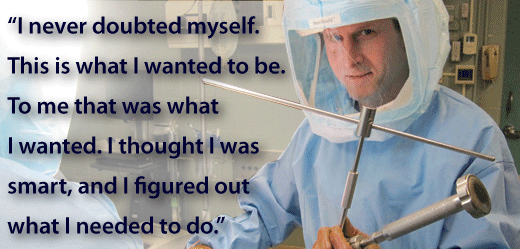
Tyler Lucas is a member of the Alpha Omega Alpha Honor Society, an honor he received as a fourth-year medical student. He also received the Golden Scalpel award as a surgical resident for outstanding achievements in surgery. The impact that Dr. Lucas has on his patients’ lives is immeasurable. Many times, he is giving them their lives back, by restoring their freedom to move as they had before their injuries.
For Dr. Tyler Lucas, there are some memories that are indelible, like his first patient as an orthopedic resident. “I remember taking my first call, my first 24-hour period as an orthopedic resident, and being able to reset the broken arm of a four-year-old boy and feeling so good about being able to set his arm and put it in a cast and see how happy his mother was when I showed her the X-ray that his arm was straight again and he would heal with a straight arm,” Dr. Lucas recalls. Then there are other things that are also frozen in memory, like his MCAT scores, where on the first three sections (biology, chemistry, and physics) he scored in the 90th percentile. And then there was the fourth, and last: reading. “I didn’t even finish that section. By the end of the allotted time period, I probably had about 70 questions—half the section—still to go. I ended up just penciling in Bs on the rest of the answer sheet, scoring only in the 50th percentile for that portion, which was unacceptable for medical school. Fortunately, it was just one section in the test, but in every interview for medical school admissions, they asked me why I thought I did so poorly on the reading section. I told people that I just didn’t finish the section.”
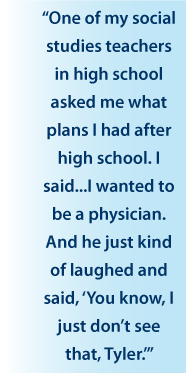 The reason why Lucas wasn’t able to complete the section was because he is dyslexic. Had he had more time, his score likely would have been in line with his percentiles on the other three sections. But, as Dr. Sally Shaywitz, co-director of the Yale Center for Dyslexia and Creativity and renowned dyslexia expert, says, “Dyslexia robs a person of time.” Lucas further explains how he processes words: “I’ve never been able to just read with my eyes and have those words in my brain. I have to almost mouth out the words to myself for me to hear them. I do it silently, but I’m still moving my lips constantly as I read. You can imagine that even having to do that slows somebody down.” Lucas’s MCAT scores are a perfect example of the huge discrepancy between a person’s intelligence and his reading ability; it is also a compelling call for testing accommodations.
The reason why Lucas wasn’t able to complete the section was because he is dyslexic. Had he had more time, his score likely would have been in line with his percentiles on the other three sections. But, as Dr. Sally Shaywitz, co-director of the Yale Center for Dyslexia and Creativity and renowned dyslexia expert, says, “Dyslexia robs a person of time.” Lucas further explains how he processes words: “I’ve never been able to just read with my eyes and have those words in my brain. I have to almost mouth out the words to myself for me to hear them. I do it silently, but I’m still moving my lips constantly as I read. You can imagine that even having to do that slows somebody down.” Lucas’s MCAT scores are a perfect example of the huge discrepancy between a person’s intelligence and his reading ability; it is also a compelling call for testing accommodations.
Despite receiving a lower score than he was capable of achieving, several medical schools called him in for interviews and Lucas ended up choosing Tulane University School of Medicine, where, as a fourth-year medical student, he was admitted into Alpha Omega Alpha, the medical school honor society that is reserved for the top 8–10% of each graduating class. He was also honored with the Golden Scalpel award. Now Dr. Lucas is the chief of orthopedics at New York’s City’s Metropolitan Hospital.
“For some people, it may be hard to imagine that their doctor, someone to whom they entrust their health care, could also be someone who struggled to read; however, often the people who work a little harder for a goal end up being just as successful—if not more so—than their counterparts who coasted through. And they are certainly more passionate,” says Lucas
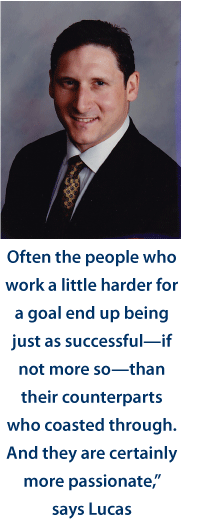 “I remember wanting to be a doctor as far back as the age of four,” says Lucas. “One of my social studies teachers in high school asked me what plans I had after high school. I said, ‘Well, I’m going to go to college, and do liberal arts, but study sciences and be pre-med.’ I wanted to be a physician. And he just kind of laughed and said, ‘You know, I just don’t see that, Tyler. I mean, you’re bright, but you’re not going to be able to handle college or medical school education.’ He just laughed and brushed me off completely.”
“I remember wanting to be a doctor as far back as the age of four,” says Lucas. “One of my social studies teachers in high school asked me what plans I had after high school. I said, ‘Well, I’m going to go to college, and do liberal arts, but study sciences and be pre-med.’ I wanted to be a physician. And he just kind of laughed and said, ‘You know, I just don’t see that, Tyler. I mean, you’re bright, but you’re not going to be able to handle college or medical school education.’ He just laughed and brushed me off completely.”
Obviously, Lucas didn’t heed his teacher’s views, and followed the path toward becoming a doctor. He recalls, “I never doubted myself. This is what I wanted to be. To me that was what I wanted. I thought I was smart, and I figured out what I needed to do. It was just getting through the material; and in order to get through the material, it was going to take me much longer than everyone else and I would have to read it several times to commit it to memory, and I was able to do that.”
“Years later, every day that I go to work, I really still love what I do,” says Dr. Lucas. “Patients come in with a pain, and either by doing surgery or the laying on of my hands I can give them the comfort that changes their lives right then.”
Related
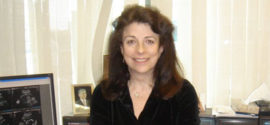
Beryl Benacerraf, M.D., Radiologist & Expert in Ultrasound During Pregnancy
A pioneer in radiology, particularly fetal ultrasonography, Dr. Benacerraf was among the first physicians to recognize the correlation between Down syndrome and physical signs, including an extra fold of skin on the fetus’s neck, as observed during an ultrasound. She is also the editor-in-chief of the Journal of Ultrasound in Medicine.
Read More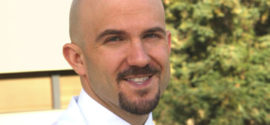
Blake Charlton, M.D., Author & Cardiologist Fellow at the University of California, S..
Blake Charlton would appear to have it all. A summa cum laude graduate of Yale University, a graduate of Stanford Medical School, and a published author, whose debut novel, Spellwright, was released to glowing reviews from the science fiction community and the publishing industry at large. The novel was the first of a nearly finished trilogy published by Tor Books. Set in a world where words can be physically peeled off a page and used to cast spells, Spellwright relates the misadventures of a wizard named Nicodemus Weal, who has a gift for producing magical language, but a disability that makes any text he touches misspell, with devastating consequences.
Read More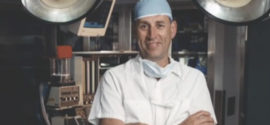
Delos “Toby” Cosgrove, M.D., Former President & CEO of Cleveland Clinic
Delos (“Toby”) M. Cosgrove, M.D., is president and chief executive officer of Cleveland Clinic. Under his leadership, Cleveland Clinic has experienced improved clinical outcomes and increased patient satisfaction, and expanded locally, nationally and internationally. Dr. Cosgrove has enacted policies focused on quality improvement, improved patient experience, and greater transparency and accountability at all levels of the organization.
Read More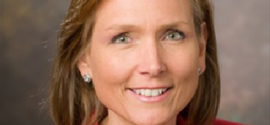
Karen Santucci, M.D., Children’s Emergency Department Medical Director & Sectio..
As a resident, Dr. Karen Santucci was nominated for and honored with admission in the prestigious medical honor society, Alpha Omega Alpha (AA). Throughout her career, Santucci has received numerous awards for her outstanding work in pediatric emergency medicine. In addition, she created AMISTAD, a program that brings in adolescent and teenage students from local area schools to act as patients so that Yale’s medical students can develop their training and learn to work with an often-challenging age group.
